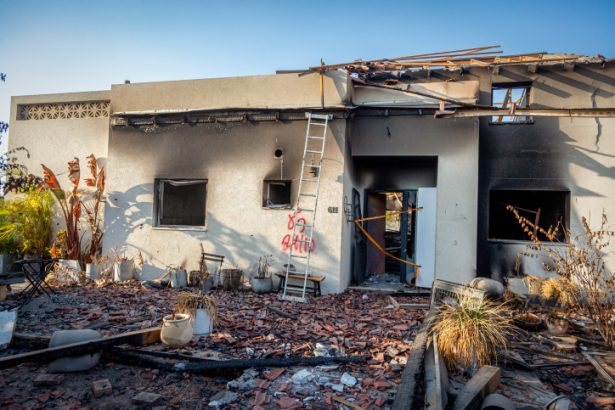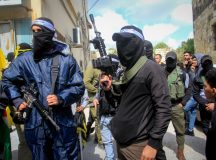Cary Nelson argues that Lara Sheehi’s comments over recent weeks have provided a roadmap for rationalising the nightmare events of October 7. It is important we counter this project to dehumanise the Jewish dead.
‘It’s such bad faith when we just focus on Hamas … when we know that people all across Palestine are being kidnapped, are being targeted, are being assassinated.’ Even though this declaration offered in the wake of the 7 October murder spree arrives from one of Hamas’s most uncompromising Western advocates—George Washington University psychology professor Lara Sheehi—one may be permitted some uncertainty about exactly how its series of accusations applies to Israel, the intended target. The quotation is taken from an October 27, 2023, video interview with Lara and Stephen Sheehi hosted by Jared Ware as part of the ‘Millennials are Killing Capitalism’ series that will be my initial focus here. As always, each agreed with everything the other says. As in earlier interviews; they present themselves as interchangeable.
Israel’s 2023 operation in Gaza alone cannot be stretched to account for Sheehi’s list of crimes; even if you add the recent West Bank settler violence that is implicit in ‘all across Palestine,’ the fit is at best imprecise. Not that it matters to Sheehi’s loyal US campus audience, some of whom are eager to chant ‘Palestine will be free from the river to the sea’ without being prepared to name either the river or the sea in question.
Sheehi, who does most of the talking in the 133-minute interview, is among those radical left anti-Zionists who are fishing for ways to justify the Hamas pogrom. Establishing a false equivalence between Israeli and Hamas violence—’two wrongs do not make a right’—would have been one obvious strategy, but Sheehi is in the vanguard of those Hamas apologists for whom Israeli violence is fundamentally worse, Hamas being reactive and defensive, the shock troops of a people sinned against and seeking freedom from oppression.
Thus, she tells us in the interview that ‘we need to reckon with how horrific liberation can be,’ referencing the details of October 7 only obliquely, but making it clear that we must learn the bracing necessity to embrace the deliberate tactic of organized murderous rampage and making it easier for us by making ‘liberation’ the object of ‘horrific.’ Should we really sing out ‘liberation’ in response to a shooting or a beheading video? Say ‘It’s not a massacre; it’s a liberation campaign’?
What alternative did Hamas have, Sheehi wonders: ‘You want folks in Gaza to just sit in a cage and wait ‘til death?’ There is another route to normalising the violence, at least for observers in the West: ‘We have to rid ourselves of the romantic notions of what uprisings look like.’ We must abandon our illusions; freedom has a grisly price, one we must not be reluctant to pay. I assume she hasn’t the temerity to offer this advice to Israelis who lost their parents, their children, their spouses, or a third of their neighbours in a kibbutz. But then I’m probably wrong. She believes Israeli conduct made the murders necessary. In fact, she offers not one sentence in sympathy for Israelis or the Jewish people. They are all revolutionary collateral damage, the satisfying cost of Operation Al-Aqsa Flood.
Except for the violence, the same unyielding revolutionary message applies to members of the psychology profession, who, according to her, ‘have been pathologizing madness under conditions of oppression.’ Personal histories will no longer be credited as a cause of mental illness; They too will be swept aside: ‘We are no longer OK with the system of psychology as it is.’ Palestinian psychological problems must now all be attributed to the occupation. And those who believe otherwise must be removed from the profession.
She does make a particularly outrageous comparison in the interview: ‘Grenades were OK for Ukrainians but not for Gazans?’ Hamas threw grenades into Israeli family rooms and into tiny concrete shelters packed with teenagers fleeing the killing zone created at an outdoor rock concert. The Ukrainians were using grenades against the soldiers of an invading army. What kind of moral blindness keeps Sheehi from understanding that her invidious remark, in parallel with the Hamas attack, crosses a line into barbarism? Can she rejoin civilisation after imposing her Ukrainian question on us? Is this simply one more point of view a university should protect? This is perhaps the end point of a decision to employ comparisons in such a way as to obliterate differences and distinctions.
They predictably described the Israeli bombing campaign in Gaza as another Holocaust, so Stephen Sheehi consequently declares that ‘Israel is a genocidal state.’ He applies a standard Holocaust question to Gaza: ‘How do you represent the unrepresentable?’ Yes. The pain of losing a child to a bomb is unrepresentable for any parent, now or in the past—in Israel, Gaza, or anywhere else in the world— though the process of dropping bombs is entirely representable. Israelis, moreover, do not rampage through villages seeking children and babies to butcher, then send home celebratory photos or videos. The tactics in use in Israel’s campaign, conversely, are not uniquely horrific. Bombing campaigns are familiar from more than a hundred years of warfare. The way Hamas conducted itself is not. Every adjective we apply seems inadequate. The bestial horrors Hamas perpetrated are beyond our understanding. We cannot get inside the heads of those giddy with bloodletting. Absolute evil cannot be incorporated in our understanding.
Stephen Sheehi thinks he can normalise 10/7 and discount or trivialise our revulsion: ‘Palestinians aren’t allowed to be happy that they broke out of jail.’ Yet that even minimizes the trope of Gaza as a ‘open-air prison,’ which was already inaccurate. Families live in Gaza. People go to work, to worship, and to school. They take small fishing boats a little ways into the Mediterranean. Those people who wanted to leave Gaza over the years and couldn’t do so certainly felt trapped, but that did not make the prison analogy accurate. Lara Sheehi is, however, accurate in saying ‘we are seeing intergenerational trauma that is to come in real time,’ though she sees it on only one side of the Gazan border. But I am not convinced that Gaza in 2023 ‘is another genocide we will talk about in 50 or 100 years.’ She also tells us ‘the Palestinian struggle and the liberation of all Arab peoples runs through Jerusalem,’ as if Arabs cannot free themselves of their own oppressive regimes unless Israel is first overthrown, an overblown exhortation that would be difficult to demonstrate through rational analysis. Exaggeration is, of course, another obvious way of rationalising the pogrom and linking its Jewish victims to a worldwide Jewish conspiracy. But exaggeration here embodies a specific obscenity: Jews were murdered that day in service of region-wide Arab liberation.
Exaggeration applies as well to the characterization of US support for the Israeli campaign: ‘The US is now an active perpetrator of genocide in Palestine.’ That leads to another sardonic analogy, this time from her Stephen Sheehi: ‘Everyone is waiting for the cavalry once again to show up against indigenous people.’ She cannot get enough distance to see why her own anecdote about the US actually blocks consideration of what might be a rational proposal, a proposal in fact that a colleague had already proposed to me. Stephen reports hearing that Biden visited the Arab capitals proposing a mass population transfer out of Gaza, asking them each to accept 200,000 refugees. How reliable his intelligence is I cannot say. But if Gaza really is apocalyptically overcrowded, as so many insist it is, and if Arab countries actually committed to grant refugees full citizenship, perhaps accepting some neighbourhoods or religious communities intact, why would that not offer relief and a way for less burdened postwar Gaza reconstruction? If it is offered as a free choice, not a forced transfer, one expects that a significant number would jump at the chance, assuming Hamas still existed and would let them leave and Egypt would permit transit.
All these quotations so far come from the October 27th interview. Enough time had passed since 10/7 for Sheehi to arrive at a more considered analysis. But they continue to insist the terrorist designation ‘pathologizes Hamas.’ Yet neither of them oddly even mentions the name ‘Hamas’ until the final 15 minutes of the interview. They want us to think of Hamas as an absent agent on October 7; Israel is simply meeting the fate its actions earned.
On 22 May 2021, Lara Sheehi tweeted: ‘If you see this and STILL entertain for even a split second that Hamas is a terrorist entity, there is literally zero hope for you, your soul, or your general existence as an ethical human being in this world.’ Hamas’s conduct on the 7 October has not led her to reconsider. Even the notorious Hamas supporter Judith Butler had second thoughts and condemned the massacre in The London Review of Books. But not Sheehi. Her perspective is one of unqualified devotion. And her commitment to Hamas includes equally unqualified condemnation of all those on earth who do not share her passion. Her rejection of those who even consider the possibility that Hamas is a terrorist group leaves no room for debate or discussion. Within a few days of the 7 October massacre, Sheehi doubled down on her support for Hamas. She immediately endorsed the massacre on Instagram, where she posts as psychoanalystactivist.
She also declared her support for George Washington U’s Students for Justice in Palestine chapter and castigated GWU’s president Ellen Cranberg. Cranberg issued a reasonable statement that succinctly refused both false equivalency and the argument that Israel deserved what it got. ‘We know there is a long and complex history associated with this conflict,’ she wrote. ‘Still, this does not justify the evil we have collectively witnessed,’ adding ‘I not only condemn terrorism, but I also abhor the celebration of terrorism and attempts to perpetuate rhetoric or imagery that glorifies acts of violence.’ ‘How dare you, Ellen Cranberg’ Sheehi countered, ‘How dare you call our mourning a “celebration of terrorism.” How dare you slander the names of our martyrs as terrorists.’ Sheehi may have had a double motivation for issuing her rejoinder. It is entirely consistent with her established views, but she may have also been aiming to inoculate herself from any sanctions by the president. In any case, GWU students soon projected a large ‘GLORY TO OUR MARTYRS’ slogan on the side of a library building, making it clear the campus was a hostile environment for Jews supportive of Israel.
Despite all this, which is added to the history of tweets and scholarship detailed in these pages earlier, Lara Sheehi has been able to get away with continuing as 2023 president of the influential Division 39 of the American Psychological Association (APA), the Society for Psychoanalysis and Psychoanalytic Psychology. Protests to APA leaders from a number of clinical psychologists who are past and present members of that and other APA divisions were simply ignored. Some prominent APA members embrace Sheehi’s love for Hamas and the hatred of Israel it embodies. APA leaders realize her presidency ends in December 2023. They are waiting out the protests until they become moot. But the APA will long be identified with the antisemitic Division head who endorsed a Hamas pogrom. I participate weekly in group discussions among Jewish psychologists who confirm their unsuccessful efforts to get meaningful responses from the APA leadership. There is no getting past this APA scandal if the organisation’s leaders simply bury their heads in the sand. But matters may get worse before long, as a potential public scandal at GW will draw more attention to APA’s cowardice and antisemitism.
For several years, Sheehi has taught a diversity course that all first-year students, including Jews and Israelis, in GWU’s graduate program in psychology are required to take. She taught the course in fall 2022 and may teach it again in fall 2024. Jewish students will have to suffer through lectures by a faculty member who shares the blood lust of the Hamas murderers. One might as well hire a Hamas spokesperson to teach the course.
For GWU administrators to assign her a required course itself amounts to harassment of Jewish students and support for terrorism. If this plan goes forward, line administrators from the program through the upper administration should be pressed to resign. Public demonstrations should demand Sheehi’s removal from any required course. GWU is already under investigation by the Office of Civil Rights in the US Department of Education, accused of endorsing Sheehi’s retaliation against her Jewish students. But the case against GW will become more serious now that Sheehi has embraced the worst violence against Jews since the Holocaust.
Sheehi is an assistant professor who is being considered for permanent academic tenure. The university is entirely within its rights to take Sheehi’s support for a bestial massacre into account when reviewing her case. Her academic publications, including the book the Sheehis coauthored, Psychoanalysis Under Occupation, embody her radical anti-Zionism. Her love of Hamas is part of her professional profile. And it is at the core of the persona she has established for her students, her colleagues, and the world at large. Promoting terrorism is not an activity protected by academic freedom. She can say what she wants, but her words are subject to professional evaluation. They are not protected from all consequences.
That does not mean confronting her antisemitism during a tenure review will be easy. Her fans among faculty members across the country are numerous, and they will be happy to write rave letters on her behalf. Her book has received several enthusiastic reviews from the same constituency. Moreover, universities appropriately ignore outside efforts to intervene in tenure cases. Indeed, unsolicited letters are not included in the file compiled for a tenure review. A campaign against her teaching a required course, however, is both warranted and necessary. Similarly, public criticism of all her activities is justified and entirely appropriate. Her negative impact on GW’s reputation and her pattern of encouraging campus antisemitism should both be a matter of record. Her support for the October pogrom adds a new and especially poisonous element to that record. Public discussion of her tenure—including what should count as evidence and the principles at stake—are appropriate and likely inevitable. Indeed, rising faculty antisemitism make public discussions of her case and others necessary. So long as the professoriate believes vehement hatred is a sacrosanct category of faculty speech it is clear universities cannot be counted on to adjudicate the relevant issues.
Her social media comments nonetheless present special challenges. As I detail in my forthcoming Hate Speech and Academic Freedom: The Antisemitic Assault on Basic Principles, since 2015 the AAUP has urged against doing any professional evaluation of faculty social media posts, a position that I argue is irrational and damaging to the academy. The AAUP position as a consequence is that a European historian can be a Holocaust denier on Facebook, and that’s OK. A paleontologist can say ‘God only put the dinosaurs on earth to test our faith 50,000 years ago’ on X, formerly Twitter, and that’s OK. But universities are not bound to adopt the AAUP position, which has not been incorporated into the official Academic Freedom and Tenure rules. In the book I provide the arguments about why universities should not adopt this policy. A colleague wrote in the Chronicle of Higher Education that the AAUP position should be expanded, that a faculty member should be able to indulge in ‘white supremacist ravings’ on social media without facing any consequences. I was on the AAUP’s Committee A when they adopted their position in 2015, and I argued against it, but I lost the debate. The Sheehi case may provide a test case for whether faculty have any responsibility for what they say in public about their areas of research.




































